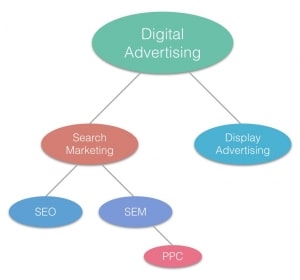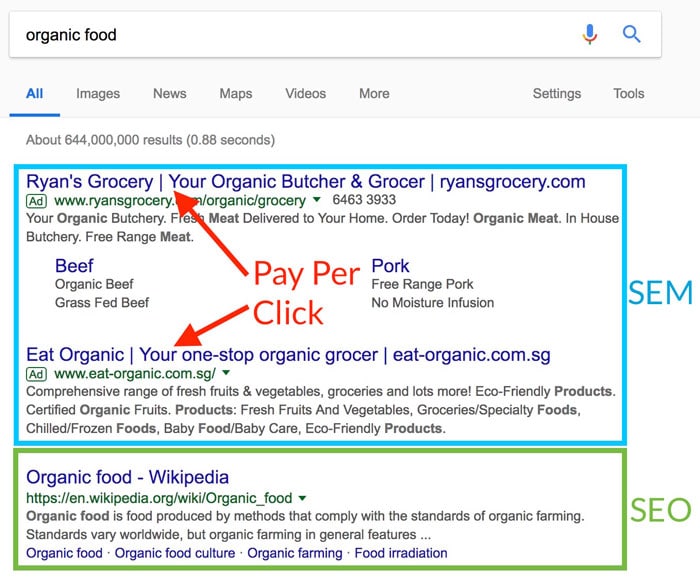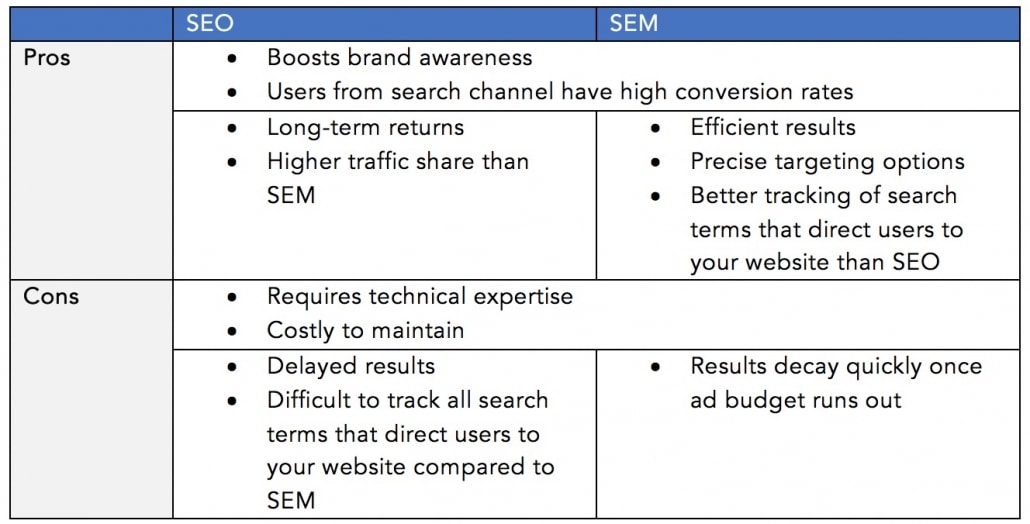SEO or SEM? – Examples, Differences, Pros & Cons (Comparison Table)
SEO, SEM, and PPC. These terms have been used interchangeably for the longest time. But are they really the same?
This article aims to iron out the definition of each discipline and provide you with a clearer understanding on the features, differences, pros, and cons.
What is SEO and SEM, and What is PPC Exactly?
SEO or Search Engine Optimisation is the process of optimising a website to rank prominently on the organic search results.
SEM or Search Engine Marketing is a subset of digital advertising, associated with targeting a website to rank on the paid search engine results pages.
PPC or Pay Per Click refers to the buying model in which advertisers pay a fee for every click their ad receives.
Based on the above definitions, SEO and SEM both exist within the umbrella term “Search Marketing”. And while PPC is a buying model which is commonly and inaccurately used interchangeably with SEM, it isn’t wrong to say that SEM and PPC co-exist within the same subset of Digital Advertising – Search Advertising.
Note that there are other subsets of Digital Advertising that include:
- Display Advertising
- Social Media Advertising
- Programmatic Real Time Bidding
- Mobile Advertising
The Main Difference Between SEO and SEM
The main difference between SEO and SEM is that SEO is a method of ranking a website on the organic search results while SEM is based on a pay per click model of displaying text ads above the organic search results.
To better illustrate this, let’s put on the hat of a Marketing Executive of a B2B organic food supplier.
Your clients are looking for products like yours on Google and they’re typing in search terms such as “organic food”.
To be visible and potentially acquire clients at this crucial moment, your website needs to be ranked highly on the paid search results, organic search results, or in the best-case scenario, BOTH.
To rank on the paid search results, you set up your ads and target keywords on Google AdWords. Within a day, your company website ranks on the top 4 positions of Google whenever a potential client searches for your target keywords e.g. “organic food suppliers”.
However, you have to pay Google AdWords a fee every time a user clicks on your ad. That’s because Google AdWords charges advertisers based on a pay per click or PPC model.
After evaluating your costs vs results, you realise you may not be able to maintain your budget for the long term as more and more competitors bid and compete for the same target keywords.
You decide to invest in an SEO strategy to rank your website on the organic search results instead, where clicks don’t cost you anything.
The Similarities and Differences Between SEO and SEM
We know that both SEO and SEM are subsets of search marketing that co-exist in the same channel of search. We also know that we have to pay a fee for every click for SEM traffic while we pay nothing for clicks from SEO efforts.
With that said, here’s a list of similarities and differences between SEO and SEM.
Similarities
- SEO and SEM both co-exist on the same channel – The search channel
- Both SEO and SEM are intent-based marketing
- Being visible on either SEM or SEO search results boosts brand awareness regardless of whether you get any clicks
Differences
- SEM search results (up to 4 paid search results) appear above SEO search results (up to 10 organic search results)
- SEM search results are demarcated with an Ad symbol while SEO search results aren’t
- SEO search results have different features from SEM search results such as featured snippets while SEM results have ad extension features
- SEM drives paid traffic while SEO drives organic (non-paid) traffic
- SEO efforts take a longer time to show results than SEM efforts
SEO vs SEM – Pros and Cons
The pros and cons of SEO and SEM, as outlined in the comparison table below.
People become more aware of your brand when they see your website ranking for multiple search terms, even if they don’t click into it. Traffic acquired from the search channel tend to have higher conversion rates, as search is an intent-based marketing channel.
SEO may not be very effective in the short term but it boosts long-term returns, and SEO efforts can take anywhere from weeks to months to see visible results. Once you’re ranked high organically, you’ll be up there for a good amount of time. This isn’t the case for SEM as your ads will stop showing the moment your ad budget runs out. Organic search results also tend to get more clicks than paid search results, but it depends on the industry and specific search terms that are used.
With SEM, however, it can take less than an hour to set up a Google AdWords campaign and start driving traffic. That’s as fast as launching a makeshift lemonade stand along the street.
You also get more precise targeting options such as choosing what time and day to show your ads, which countries you want your ads to appear in, and which position you want your ad to rank. On top of that, you’re able to track exactly what search terms were used to get to your website from Google (You get limited data from the organic search results).
For example, if you targeted the search term “organic food Singapore” and a user typed in close variant “organic foods Singapore”, you’ll be able to see the plural form in your reports as well.
Both SEO and SEM require technical and platform expertise to outperform your competitors and generate a positive ROI. This means it can be difficult and costly to hire in-house specialists to execute and oversee your campaigns. Because of this, the option of hiring a digital marketing agency or an SEO agency is a rather popular choice for marketing departments.
Should You Do SEO or SEM?
It depends. Ask any digital marketing expert, and he or she will advise you to run both SEO and SEM campaigns if you have the sufficient required marketing budget. However, there are several factors that could affect your decision whether to do only SEO, SEM, or both.
For instance:
- Short customer lifecycle: If you’re launching a promotional product marketing campaign with a short buying cycle i.e. 1 month, you won’t have the time to wait for your SEO efforts to boost your website to page 1. You need to execute an SEM campaign and get on top of the search results pages asap.
- You want to maximise traffic from the search channel: Studies have shown that ranking on both the paid and organic search results pages result in incremental clicks overall. In this case, you want to run both SEO and SEM campaigns simultaneously.
- Competition on paid search is over the roof: If a click costs you $58.64 and your profit margin is negative, you shouldn’t be doing SEM unless you’re okay with donating to Google.
- You want to test the market: Since SEM can get you visibility very quickly, you can test which keywords convert better. After analysing your performance, you can then direct your focus to keywords that convert better in your SEO campaign.
There are many factors that could affect your decision whether to run SEM, SEO, or both. Take the time to analyse your industry and make a decision driven by data, not guesswork.
If you want to learn how to improve your organic search engine rankings via SEO, check out our hands-on SEO course. If you need to quickly generate search traffic and can’t wait six months or longer for SEO to take effect, SEM may be a better choice. In this case, our Google Ads course covers how to set up an Google SEM campaign from scratch. Feel free to also browse our wide array of digital marketing courses taught in-person in Singapore or online.
Dylan Sun is the Founder of Equinet Academy, a SkillsFuture Singapore WSQ-Accredited Digital Marketing training organisation. Passionate in all aspects of Digital Marketing and SEO, he extends his passion to helping people implement effective digital strategies to their businesses. Follow his blog at Equinet Academy to learn more about Digital Marketing.



I personally found this article very interesting. The similarities, as well as differences between seo and sem are well explained in this very blog. I had my doubts earlier, but now I’m pretty much clear about it. I would definitely recommend this to my fellow colleagues.
Loved the article , it was short and crisp and the important aspects about SEM PPC and SEO were highlighted. Found it very helpful . THANKYOUU!